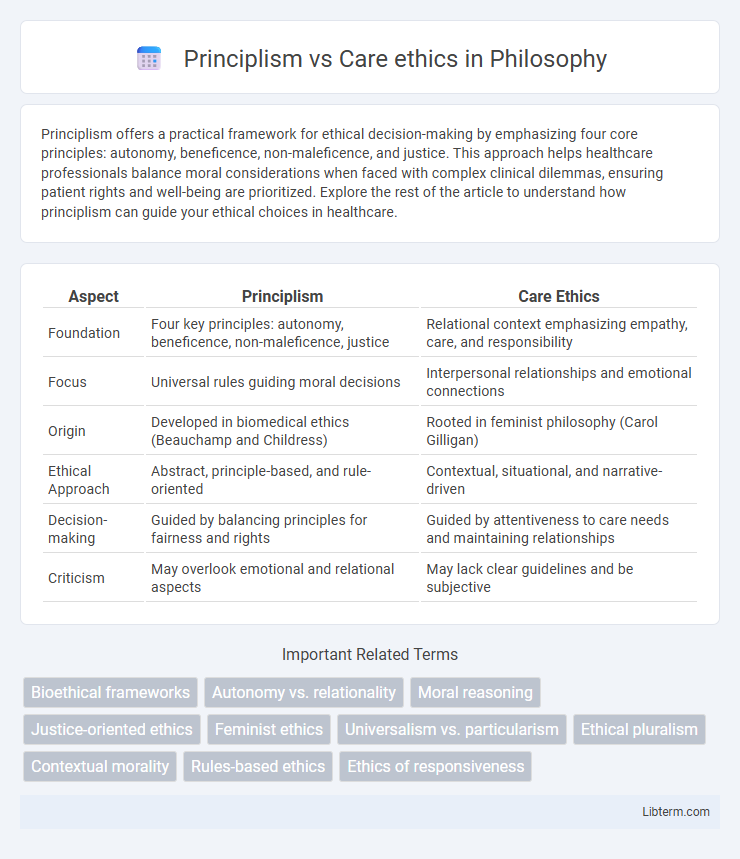Principlism offers a practical framework for ethical decision-making by emphasizing four core principles: autonomy, beneficence, non-maleficence, and justice. This approach helps healthcare professionals balance moral considerations when faced with complex clinical dilemmas, ensuring patient rights and well-being are prioritized. Explore the rest of the article to understand how principlism can guide your ethical choices in healthcare.
Table of Comparison
| Aspect | Principlism | Care Ethics |
|---|---|---|
| Foundation | Four key principles: autonomy, beneficence, non-maleficence, justice | Relational context emphasizing empathy, care, and responsibility |
| Focus | Universal rules guiding moral decisions | Interpersonal relationships and emotional connections |
| Origin | Developed in biomedical ethics (Beauchamp and Childress) | Rooted in feminist philosophy (Carol Gilligan) |
| Ethical Approach | Abstract, principle-based, and rule-oriented | Contextual, situational, and narrative-driven |
| Decision-making | Guided by balancing principles for fairness and rights | Guided by attentiveness to care needs and maintaining relationships |
| Criticism | May overlook emotional and relational aspects | May lack clear guidelines and be subjective |
Introduction to Principlism and Care Ethics
Principlism, founded on four core principles--autonomy, beneficence, non-maleficence, and justice--serves as a foundational framework in bioethics for resolving moral dilemmas by balancing universal ethical standards. Care ethics emphasizes relational interdependence, prioritizing empathy, compassion, and the moral significance of caregiving relationships over abstract principles. These contrasting approaches highlight principlism's structured decision-making versus care ethics' focus on context-sensitive, nurturing human interactions.
Historical Origins of Principlism
Principlism emerged in the late 20th century as a framework in bioethics, primarily shaped by the work of Tom Beauchamp and James Childress in their book "Principles of Biomedical Ethics" (1979). This approach synthesizes four core principles: autonomy, beneficence, nonmaleficence, and justice, drawing from Western philosophical traditions such as Kantian ethics and utilitarianism. Principlism's historical development reflects a response to the need for a common, practical ethical language in clinical decision-making and research ethics.
Historical Development of Care Ethics
Care ethics emerged in the late 20th century as a response to the perceived limitations of Principlism, which emphasizes universal moral rules like autonomy, beneficence, non-maleficence, and justice. Pioneered by feminist philosophers such as Carol Gilligan and Nel Noddings, care ethics centers on relationships, empathy, and contextual understanding rather than abstract principles. This historical evolution highlights a shift towards valuing emotional engagement and the moral significance of care in ethical decision-making.
Key Principles of Principlism
Principlism is grounded in four key ethical principles: autonomy, beneficence, non-maleficence, and justice, which collectively guide moral decision-making in healthcare. Autonomy emphasizes respecting patients' rights to make informed choices, beneficence promotes actions that benefit the patient, non-maleficence insists on avoiding harm, and justice focuses on fairness in the distribution of healthcare resources. These principles provide a structured framework that contrasts with Care ethics, which prioritizes relational context and emotional responsiveness over rule-based guidelines.
Core Concepts of Care Ethics
Care ethics centers on relational interdependence, emphasizing empathy, responsibility, and the nurturing of human connections as fundamental moral principles. It challenges the abstraction of universal rules found in principlism by prioritizing context-specific sensitivity and emotional engagement in ethical decision-making. Core concepts include attentiveness, responsiveness, and the moral significance of maintaining and repairing relationships, contrasting principlism's focus on autonomy, justice, beneficence, and nonmaleficence.
Comparative Analysis: Objectivity vs. Relationality
Principlism emphasizes objective moral principles such as autonomy, beneficence, non-maleficence, and justice to guide ethical decision-making, ensuring consistency and universal applicability across diverse situations. In contrast, Care ethics prioritizes relationality by focusing on the context of interpersonal relationships, empathy, and responsiveness to the needs of others, highlighting the moral significance of care and connection over abstract rules. This comparative analysis reveals principlism's strength in providing clear, standardized guidelines versus care ethics' emphasis on the nuanced, situational dynamics of human relationships.
Application in Medical Ethics
Principlism in medical ethics emphasizes four key principles--autonomy, beneficence, non-maleficence, and justice--as a framework for clinical decision-making, ensuring standardized and consistent ethical judgments. Care ethics prioritizes relational context and empathy, focusing on the patient's individual needs, emotions, and the caregiver-patient relationship to guide ethical medical practice. The application of principlism often supports guidelines and policies in healthcare settings, while care ethics offers a more personalized approach, highlighting compassion and responsiveness in clinical interactions.
Strengths and Limitations of Principlism
Principlism offers a clear framework based on four primary ethical principles: autonomy, beneficence, non-maleficence, and justice, facilitating consistent decision-making in complex medical situations. It provides a widely accepted, structured approach that is easily taught and applied across diverse healthcare contexts. However, its limitations include a potential oversimplification of ethical dilemmas by neglecting emotional and relational factors, sometimes resulting in conflicts between principles without guidance on prioritization.
Strengths and Limitations of Care Ethics
Care ethics emphasizes relational interdependence and emotional responsiveness, offering a nuanced approach to moral decision-making that prioritizes empathy and context-specific understanding. Its strength lies in addressing the complexities of human relationships often overlooked by rigid rule-based systems, such as principlism, which focuses on universal principles like autonomy and justice. However, care ethics can face limitations due to its potential subjectivity and the challenge of applying care-based judgments uniformly in diverse or large-scale ethical dilemmas.
Integrating Principlism and Care Ethics in Practice
Integrating principlism and care ethics in practice enhances ethical decision-making by combining principlism's focus on autonomy, beneficence, non-maleficence, and justice with care ethics' emphasis on relationships, empathy, and contextual sensitivity. Healthcare providers can balance universal moral principles with attentiveness to patients' individual needs and social contexts, promoting holistic and patient-centered care. This integration addresses ethical dilemmas more comprehensively, fostering trust and improving outcomes in clinical settings.
Principlism Infographic

 libterm.com
libterm.com